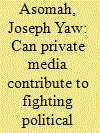|
|
|
Sort Order |
|
|
|
Items / Page
|
|
|
|
|
|
|
| Srl | Item |
| 1 |
ID:
175524


|
|
|
|
|
| Summary/Abstract |
In sub-Saharan Africa, the private media are often considered corrupt and thus incapable of performing critical watchdog functions. Using the Ghanaian case, the objective of this study is to examine how the private media contribute to exposing political corruption and demanding accountability. Based on the media-as-a-watchdog theory and on primary and secondary data, this article argues that private media outlets make significant contributions to the fight against political corruption. In-depth, semi-structured interviews were used to collect primary data in Ghana. Relevant secondary data from media reports and scholarly work supplement the primary data. The research findings show that Ghanaian private media address political corruption through investigative reporting, agenda-setting, providing a forum for anti-corruption discussions, and acting as a pressure group for institutional and legal reforms as well as political accountability. This article thus questions the popular claim that in sub-Saharan Africa, the private media cannot contribute meaningfully to combatting corruption involving influential political actors. Policy and future research implications are presented in the conclusions.
|
|
|
|
|
|
|
|
|
|
|
|
|
|
|
|
| 2 |
ID:
167390


|
|
|
|
|
| Summary/Abstract |
Since Ghana’s independence in 1957, political corruption has been a significant problem impeding the development of the country. Based on primary and secondary data, this article argues that grand corruption such as Ghanaian political corruption mainly stems from a complex interplay of greed, opportunities grounded in monopoly power, and weak deterrent systems. Hence, uncontrolled political corruption is primarily a product of consistent political leadership failure to aggressively regulate greed, reasonably limit political power, and effectively strengthen the public-sector accountability structures. To help address political corruption, major stakeholders, particularly the political leadership, should critically analyze the legal regime, power structures, and deterrent mechanisms to remove opportunities for political corruption through effective checks and balances, surveillance, and sanctions. This paper makes theoretical and empirical contributions to understanding and tackling political corruption generally.
|
|
|
|
|
|
|
|
|
|
|
|
|
|
|
|
|
|
|
|
|